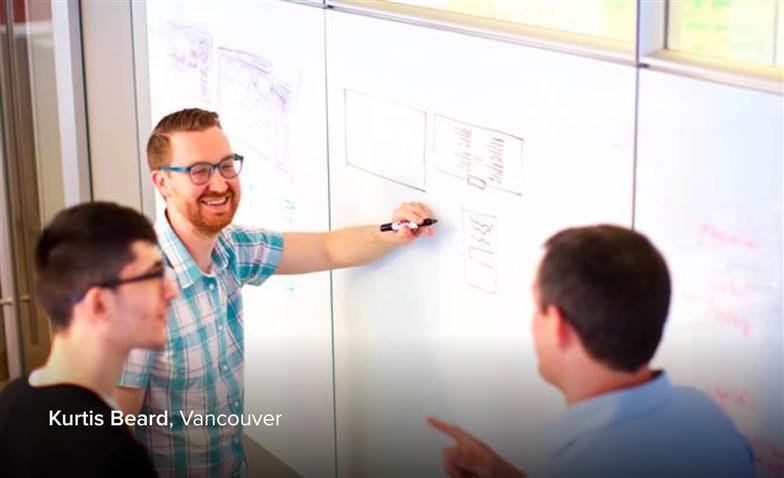When we work with organizations to discover their purpose and values, we tune in very carefully to the behaviours, skills and qualities that are most important to an organization’s success. Similarly, as we work with organizations to shape their employee experience or activate change, we start with an organization’s strengths.
We’ve heard from thousands of people across dozens of organizations what qualities they value most at work, in themselves and each other. Some of the questions we have asked people include:
- What skill or habit has served you most?
- What do you value most in a teammate?
- What do you most value in a leader?
- What’s the most important quality to be in abundance of within your work culture?
- What are the qualities of the people who make the biggest positive impact on your culture and organizational performance?
In this post, I’ll share the “superpower” skills we’ve seen to be the most impactful to people and organizations.
Listening to learn
This can also be referred to as “active listening” or “listening to understand.” Listening to learn is a natural extension of empathy and curiosity (also superpowers!).
What it means
- Choosing the path of learning over confirming your assumptions and biases
- Being open to the ideas and perspectives of others.
- Being open to expanding or adapting your opinion.
- Respecting and acknowledging the knowledge and perspectives of others.
Why it’s a superpower
- It demonstrates and builds curiosity, empathy and perspective-taking.
- It supports adaptation and agility.
- It loosens up biases and assumptions.
- People feel seen and understood and that their perspectives and contributions matter.
- It builds connection and relationship.
- You learn more about the perspective of others and the topic of discussion.
Ideas to practice and strengthen it
- Think of listening as a sport you want to get better at.
- Approach conversations with the question: “What might I learn from this conversation and person?” or “What might this person know that I don’t?”
- Consider what biases and assumptions you are holding within conversations.
- Remind yourself that you’re only one of 8 billion people. Odds are good that you have a lot to learn from other people.
- Pay attention to who it’s easiest for you to listen to learn from, and who it’s hardest with – and then practice where it’s hard.
- Practice this with someone you experience friction with and see how it changes the dynamic.
Connecting to your passions
This sometimes gets referred to as commitment or simply “caring.” No matter what you call it, passion is a big part of teams and organizations with high engagement and high performance. People like working with someone who is doing something they deeply care about; their passion is infectious. More and more organizations are creating time and space for their people to get in touch with what is personally meaningful to them because it helps individuals connect more deeply to their work, their teams and their organization.
What it is
- Knowing what fires you up and energizes you.
- Knowing what you’re intrinsically motivated to do or contribute to, regardless of external rewards.
- Knowing what gives you the greatest sense of accomplishment.
Why it’s a superpower
- Tapping into your passion energizes you and gives you a sense of personal purpose and accomplishment.
- Passion is contagious and energizes teams and work environments.
- Shared passion makes your work a place that nourishes you (with the caveat that people with a lot of passion do need to be mindful their passion doesn’t burn them out).
Ideas to practice and strengthen it
- Identify when and where you often lose track of time. Chances are good these activities will be related to your passions.
- Identify when and where you’re the most engaged, and even fascinated in an activity or content. Be as specific as possible, as this will point you in the right direction.
- Imagine the perfect day or week – there are sure to be clues to your purpose inside of this exercise.
- Reflect on some of your favourite activities as a kid – chances are they point to your passions.
- Make your passions known to others and seek opportunities to support them.
- Take the time to notice and appreciate how your current work intersects and supports your passions.
Sharing your strengths
You need to know your strengths to be able to fully share them. People tend to focus on learning what they need to strengthen, but it’s equally necessary to know your strengths so you can make full use of them. I’m still surprised when people need their biggest strengths pointed out to them – the ones that come so naturally to them that they’re “unconsciously competent” in. However, this makes sense when you think that most fish, if asked, probably wouldn’t answer “swimming.”
What it is
- Knowing the strengths that come naturally to you – like a fish swimming in water.
- Knowing when and where your strengths are most needed and how you can apply them.
- Sharing your strengths with others via knowledge sharing, supporting others in developing those strengths, and mentoring.
Why it’s a superpower
- Sharing your strengths gives you the experience of making a meaningful contribution.
- The people around you and your organization will benefit the most from your natural strengths.
- People are inspired by excellence.
- Performing at a high level helps create a culture of quality and high performance.
Ideas to practice and strengthen it
- In addition to asking for feedback or advice related to improving, ask what people most appreciate and value about you.
- Use one of the many assessment and insight tools available to help identify your strengths. We use CliftonStrengths at Habanero and also have seen the DiSC profile and Discovery Insights provide a lot of value to clients.
- Use the model below to map out your skills and competencies. It does a great job illustrating the different levels of competence and can be a great tool to help you identify your biggest, most natural strengths.
When you combine “connecting to your passion” with “sharing your strengths,” you’re in the magical zone of living your personal purpose.
Knowing how to get things done
This also gets expressed as action-oriented, accountable, or outcome-oriented. But I like the way Barack Obama said it when asked to share his career advice for young people: “Just learn how to get stuff done.”
What it is
- Stepping into ownership of tasks and responsibility.
- Being clear on the desired outcome.
- Understanding decision-making and how things get done at your organization.
- The ability to establish the next step in moving things forward.
Why it’s a superpower
- Ultimately, work is about delivering value to people via getting things done.
- Organizations can be complex, and every project, initiative and task needs a shepherd to get it done.
- Brilliant thinkers have made the world a better place, but without enough doers, organizations will fail.
Ideas to practice and strengthen it
- At the end of every meeting, ensure the necessary next steps are identified.
- Observe the habits, strengths and processes of people who get things done in your organization.
- Imagine you’re a delivery driver and your task is what needs to be delivered – which routes work best in your organization?
Inspiring trust
Inspiring trust might be the superpower of superpowers, partly because so many qualities live inside of it, and partly because it’s so incredibly valued. There’s nothing I have ever heard to be more valued in a peer, a team or an organization than the ability to trust and be trusted.
What it is
People feel they can depend on you.
People do not feel anxiety or stress about what they can expect in working with you.
People can be open and transparent in working with you.
Why it’s a superpower
- Low trust environments and relationships are draining and constraining – and just downright unhealthy. They’re like being in a car where you either want to hit the brakes or get out.
- High-trust relationships where everyone is committed to the same thing are highly satisfying, fun drives. You might hit the odd obstacle, but it gets addressed and people look forward to getting back in the car.
- In high-trust relationships, you enjoy the drive and get to your destination in a timely manner.
Ideas to practice and strengthen it
I don’t know a better way to build and strengthen trust than by using the trust equation, inspired by David Maister:
- Commit to building your expertise and knowledge in your area of focus (credibility).
- Give people the experience of being able to count on you via being responsive and doing what you say you will do, when you said you’d do it (reliability).
- Invest in getting to know people and letting them get to know you (familiarity).
- Commit to being of service to your team and the people around you. Of course, your interests matter, but when people can count on you being oriented to a shared purpose and goal (rather than self-orientation), it has a big impact on their feelings of trust with you.
- When you experience a lack of trust with someone, pinpoint if this is largely due to credibility, reliability, familiarity, or self-orientation. Often, the lack of trust is a lack of familiarity, which can quite easily be solved via spending some time together. When it’s something else, you may be able to work with the person or team to identify ways to increase trust.
Superpowers for work and life
These superpowers are immensely valuable, no matter your position or level in an organization – whether you’re just starting out in your career or more experienced, whether you are an individual contributor or manager, and whether or not your role has the word “leadership” in it.
You’ll likely find these skills are helpful in all aspects of your life, not just at work. I’ve always thought of leadership development as human development and therefore relevant to everyone in all aspects of their life.
I can almost promise you (trust me!) that you won’t regret developing any of those qualities. I would encourage you to pick one that resonates the most with you and try out one or two of the ideas provided and see how they impact you and the people around you.
We care a lot about these qualities at Habanero, and I hope they also resonate with anyone that has worked with us. We’ve seen in practice how they benefit individuals, teams, and organizations.








